Iconic Sundowners
A popular activity that is part of the safari experience is the Sundowner – stopping in the bush as the sun sets to partake in beverages, snacks and lively conversation about the day’s events. Winston Churchill asserted, “…gin and tonic has saved more Englishmen’s lives, and minds, than all the doctors in the Empire.” The popularity of gin and tonic grew in tandem with the British Empire’s expansion into Africa and was originally taken for malaria prevention. (Quinine was discovered to be beneficial against malaria in South America around the beginning of the 18th century. Quinine was then distilled into medical tonic water, which was then blended with gin, sugar, and lime to make it more enjoyable to drink.) Happy Hour in the bush nowadays includes a wide variety of beverages including excellent South African wines.
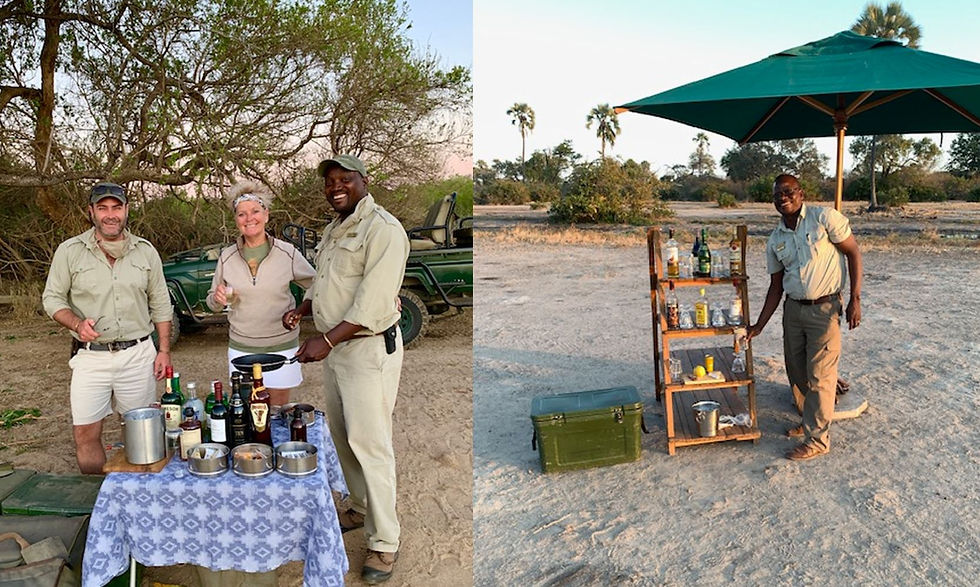
Sporting, Fitness, and Relaxation Activities
Fishing, Horse Riding, Canoeing, Mountain Biking
Many safari camps provide excursions that are near their location. These activities may be led by your safari guide or independent operators and emphasize getting out in nature.
Pools, Spas & Wellness Treatments
Recuperate after safari with a calming spa treatment for the perfect healthy holiday. Many camps and lodges offer spa experiences, most using local organic ingredients for a truly bespoke experience. A massage after a day in the safari vehicles or a day of travel is always a welcome treat. Many camps also offer either private or shared camp swimming pools to relax by during a siesta between the activities.

Just Chilling
The safari camps that Latitude represents offer comfortable common areas, often with libraries and game rooms, comfy sofas, hammocks and lounge chairs. Most rooms offer spacious, comfy areas for relaxing with a good book and a cocktail, or lounging around a deck watching the world and wildlife go by.
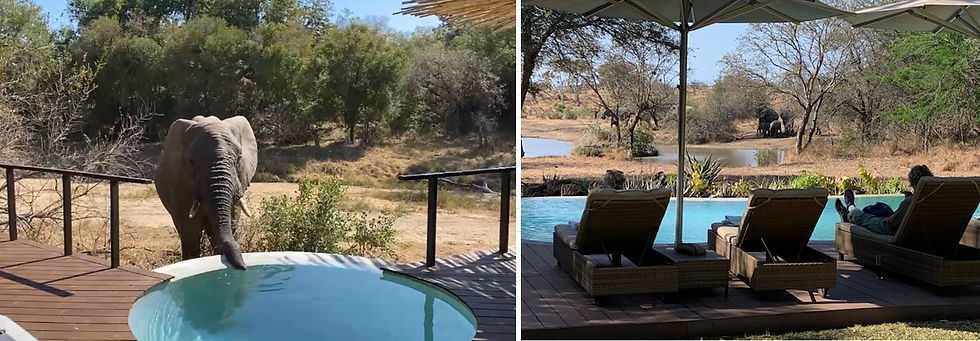
Sky-deck/ sleeping under the stars
Sky-deck camping and a.k.a. fly camping are more rustic sleep-outs under the stars on a raised platform or in a simple tent, offered by some of Africa’s most luxurious safari camps and boutique lodges. If “barefoot luxury” is what you’re after, this is it. The term “fly camping” is inspired by the old-school safaris when hunters would go out for days and sleep under a simple “fly sheet” protecting them from the sun and rain.
Fly camping today is undeniably much fancier and more comfortable, but it maintains that incredible feeling of timeless adventure and camaraderie, especially after an exhilarating day on safari. Bush dinner, sundowners, and even breakfasts are a special part of the fly camp experience, with staff comfortably close by, yet enabling a completely private sleeping experience where the sounds of the bush lull one to sleep and calls of the wild waken one with the sounds of the emerging day.
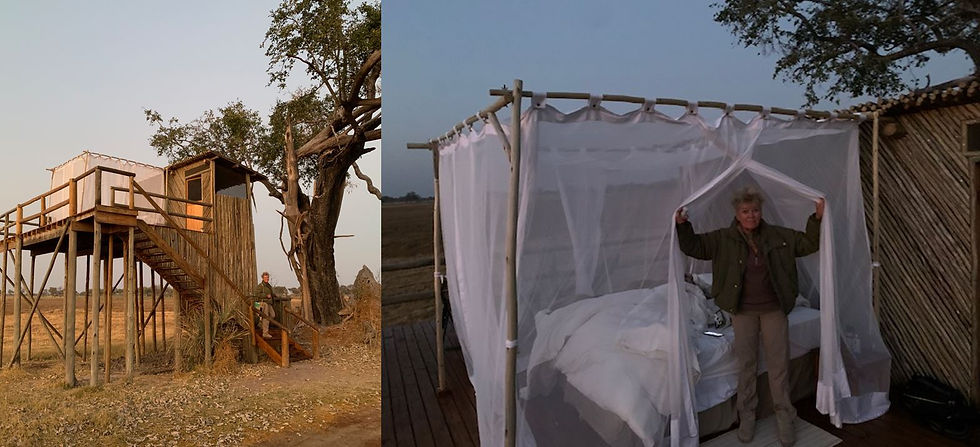
Conservation Activities
Latitude Expeditions supports conservation and research organizations. We have unique access to local efforts that protect wildlife, habitat and traditional cultures. These can involve mere visits to researchers and communities, or more hands-on activities, including school sports, teaching a class, and assisting conservationists in their daily activities
Rhino Conservation Activities: Rhino tagging/dehorning
A few camps in South Africa enable guests to be involved in rhino management activities such as darting, ear notching and collar fitting depending on the timing and plans of the veterinarians and researchers. Enjoy a once-in-a-lifetime opportunity to get up close and personal with rhinos while assisting in the conservation of this endangered species. This adventure allows guests to witness, and even participate in, the capture and darting of either a black or a white rhino. A wildlife vet will locate and dart the rhino from the vantage point of a helicopter, while the guests and ground crew will follow in open 4x4 safari vehicles. Once darted, the veterinary team will notch the sleeping animal's ear for research and security monitoring, as well as insert a microchip into the horn, enabling researchers to correctly identify different rhino on the reserve. Most camps limit the groups to eight guests who have the never-to-be-repeated opportunity of touching the anaesthetized giant during the notching procedure. Researchers can also discuss the use of AI-enabled rhino foot collars integrated with a UAV capability, and the role that these technologies play in alert-based rhino protection and monitoring. Latitude works closely with the International Rhino Foundation to support research and offer donors immersive trips to fully understand where their money goes.

Pangolin Conservation
Another unique opportunity, mainly available in South Africa is a privately guided pangolin research and monitoring experience that supports the conservation of the world's most trafficked mammal. In this interpretive and exclusive activity, guests will join a researcher as he (or she) locates one of the pangolins that has been reintroduced to the reserve. You will have the rare opportunity to observe the unique features and remarkable adaptations of these gentle creatures firsthand as the researcher does a general health check, and downloads critical research data from the UHF tag attached
Joining other research teams in their daily activities
Due to Latitude’s work with conservationists and researchers throughout safari Africa we can arrange for guests to spend the day with wildlife researchers. These activities are only available to a few lucky guests based on timing and logistics, but can involve specialists who work with lions, cheetahs, African painted dogs, or elephants. The availability depends largely on the location guests are visiting and the ability to donate to the work being done. We can help create rare opportunities to really immerse yourself in a cause for which you are passionate.
Visit to & demo of anti-poaching bloodhounds
Many camps treat guests to a demonstration of their K9 unit capability which includes detection dogs, human tracking dogs and independent tracking dogs. Guests can learn about the daily challenge of keeping rhinos and other endangered species safe from poachers who intend to cross their borders to harm these innocent animals. A demonstration usually involves a guest portraying a perp, running, and hiding in the bush and the dogs’ and trackers demonstrating the dogs’ amazing ability to hunt the scent with seemingly little scent to follow.
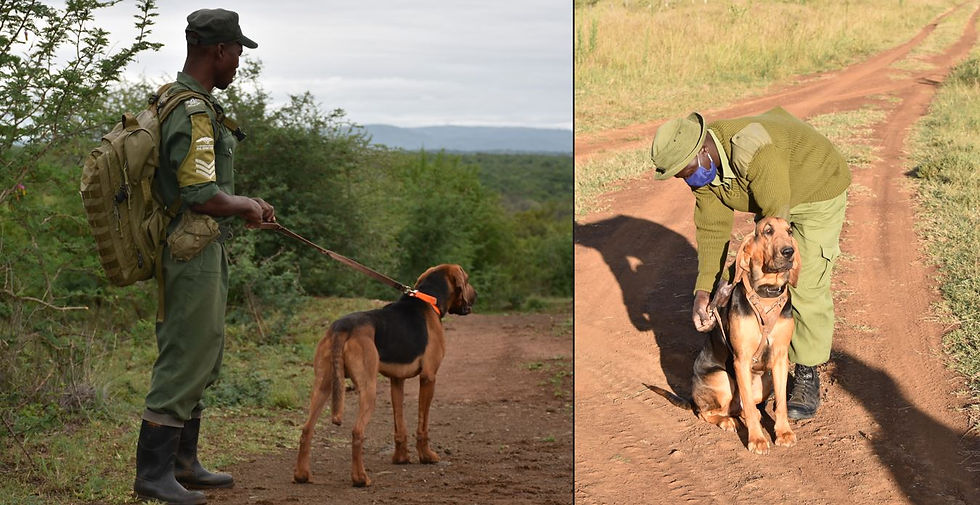
Behind the scenes visit to animal rescue center
There are a number of rescue centers whose sole purpose is to rehabilitate injured animals with the primary goal of returning the animals to the wild. While this is not always possible, especially when a newborn or “toddler” has been separated from its mother, the rescue centers attempt to give the animals a close approximation to the life they would live if they could fend for themselves. Many centers have been able to return some species such as elephants to another herd to be cared by the females of that herd, and in some cases predator species such as cheetah can form a coalition to hunt prey together and protect each other in the wild
Cultural Interaction
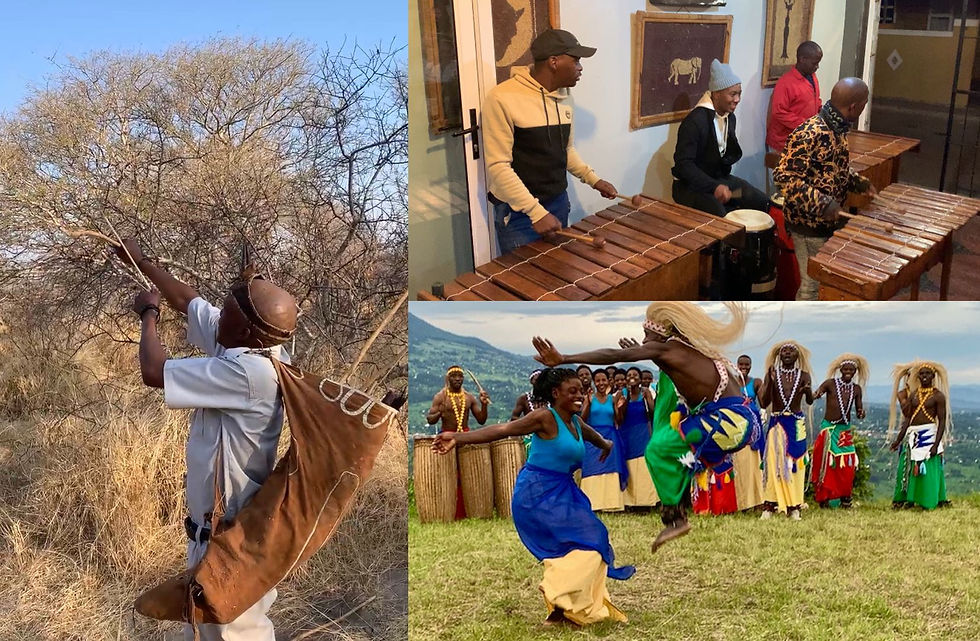
Village and school visits
Tap into the energy and history of the local communities through cultural experiences. From local crafts to immersive village visits, authenticity is at the heart of these enlightening activities. Throughout Africa, but more common in East Africa where traditional villages are abundant and close to the National Parks, guests can experience traditional cultures. With the Maasai this involves a trip to their Manyattas (mud huts), a lesson in their village setup (security, healthcare, education, and management of resources (e.g., meals, water, firewood), learning about their local market with wonderful Maasai artefacts/attire for sale, their live-stock and much more. You will learn about ancient traditions as well as contemporary struggles and adaptations to modern life. In South Africa, Botswana, Zambia, Zimbabwe and Namibia there are interesting local tribes to visit that continue their traditional ways of life.
You may also choose to spend a few hours visiting the local primary school to meet the children and sit in on a few classes, or perhaps join in on the daily football (soccer) game for a more engaging and immersive African experience.
Expand your Skills Activities

Photography Workshops
A trend within many of the camps is to offer specially outfitted photography vehicles with a limited number of guests and an experienced professional photography team. Others include full Photography studios where guests have access to digital processing for reviewing, editing, and producing “wall-worthy” prints under the watchful eye of the professionals.
Cooking and Mixology classes
The food and drinks at safari camps will delight and surprise most guests. It’s mind boggling how they can produce gourmet meals and appetizers, serve premium cocktails and mixed drinks in an environment that does not seem conducive to luxury dining or how they supply the remote camps and lodges with fresh seafood, meat, fruits, and vegetables. Chefs and bartenders are keen to share their secrets and if the camp offers the opportunity to participate in a class, jump in it!

Comments